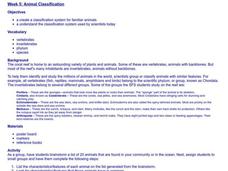Curated OER
Invertebrate Phyla
Learners explore the invertebrate phyla. They discuss the characteristics of the invertebrate Phyla in the Kingdom Animal. Students classify organisms into Phyla based on their characteristics. They distinguish radial symmetry, bilateral...
Curated OER
Classification of an Invertebrate: Sponge
Students investigate the invertebrate sponge. In this invertebrates lesson plan, students observe the sponge, Grantia, using a dissecting microscope. Students answer questions about their observations and view six other invertebrates....
NOAA
Invertebrates
Crabs and lobsters ... yum! The 18th installment of a 23-part NOAA Enrichment in Marine sciences and Oceanography (NEMO) program focuses on invertebrate marine life. After the lecture slideshow, learners conduct an activity to sample...
Curated OER
Using a Dichotomous Key for Invertebrate Phyla
Students use a key to determine the phyla of invertebrates. They are broken into groups and each group gets a stack of pictures and uses the key to determine which phyla the animal belongs to. There are also individual questions for...
Curated OER
Invertebrates and Vertebrate Evolution
Students explore the major characteristics of the major animal phyla. They describe adaptive features that have contributed to the success of animals on land. Students explain how primate evolution provides a context for understanding...
Curated OER
Hunting Invertebrate Fossils in the Classroom
Students acquire a general knowledge of fossils and paleontology, the study of evidence of life in the past and identify the major invertebrate groups (phyla) commonly found in the fossil record.
Virginia Department of Education
Animal Phyla and Plant Divisions
Searched hours for an activity that allows individuals the ability to use multiple resources to learn about both plant and animal kingdoms? This discussion and activity provide pupils with the ability to visualize each organism...
Curated OER
Appearances Are Deceiving
Young scientists study creeks around their area to see how clean the water really is. One way to tell is by the invertebrate populations that are present. This lesson introduces a game which learners simulate a variety of species found...
Curated OER
Invertebrate Vocabulary-- Marine Invertebrate Match
In this science worksheet, students study 12 vocabulary words which pertain to marine invertebrates. Students read the definitions which include pronunciation, part of speech and meaning of the name. Students then look at 16 organisms...
Curated OER
Show Some Backbone and Teach Invertebrates
Fifth graders identify two similarities and two differences between two phyla, assign fictitious invertebrate to its phylum and explain why it belongs in that grouping, and construct member of given phylum and explain why it should be...
Curated OER
Invertebrates
Young scholars identify the characteristics common to all animals. In groups, they compare the characteristics between the animals and how they are divided. To end the lesson, they compare the eight phyla of invertebrates and review...
Curated OER
The Three Worm Phyla
Ninth graders examine the three worm phyla. In this classification lesson, 9th graders observe, compare and contrast the planarian, tapeworm, and fluke.
Curated OER
Animal Classification
Young scholars list characteristics and features of animals found in their community. They then group the animals according to how they are similar and different and create names for each group. They then create a chart of their...
Curated OER
Biology Trivia Questions
Students answer 71 questions about a variety of topics in biology. In this biology trivia lesson plan, students use the internet to find the answer to questions about the systems of the body, their structures and functions, the different...
Curated OER
Invertebrate Diversity
Students observe different animals with bilateral symmetry. In this biology lesson, students compare how these animals move. They discuss the evolutionary history of observed animals.
Curated OER
What Animal Am I?
Students brainstorm different characteristics of invertebrates and investigate invertebrates by conducting Internet research.
Curated OER
Pheed the World: Edible Phyla
Students discuss the contributions of different organisms to our world. In this biology lesson, students research countries with limited food supply. They create an improvement plan for a fictitious country assigned to them.
Curated OER
Invertebrate Classification
Students discuss the recent disovery of the "furry lobster" to peak interest in the animal kingdom. They classify various speciments using invertebrate dichotomous keys, identifying major animal phyla and classes. Thy the complete the...
Curated OER
The Crusty Fossils
Learners identify some of the different species of crabs and tell how they adapt themselves to their environment. They discuss the evolution and stages of development of the crabs. They identify the Phylum Arthropoda and the Class...
Curated OER
Holy Starbucks Batman
Students investigate caffeine as a potential new pollutant in a northwest river system. Effects of caffeine on invertebrates and salmon fry will be explored through field work and lab work.
Curated OER
7th Science Quiz
This seventh grade life science quiz has a professional appearance and well-written multiple-choice questions. However, it seems to cover too broad a variety of biology topics for only 15 questions to fully assess. There is one question...
Curated OER
Spectacular Squid
Students study squid including what family they are in. In this exploratory lesson students view a video, answer questions and complete an activity on squid.
Curated OER
Vertebrates
Learners identify and describe five main groups of the Phylum Chordata. They discover that the Phylum Chordata is the vertebrates. Students identify the main difference between invertebrates and vertebrates. They read passages about...
Curated OER
Ocean Creature Classification
Students develop a Taxonomic Key for marine invertebrates from pictures they are given after practicing together with common objects, such as shoes. They then compare their key to a provided Ocean Invertebrates Taxonomic Key.























